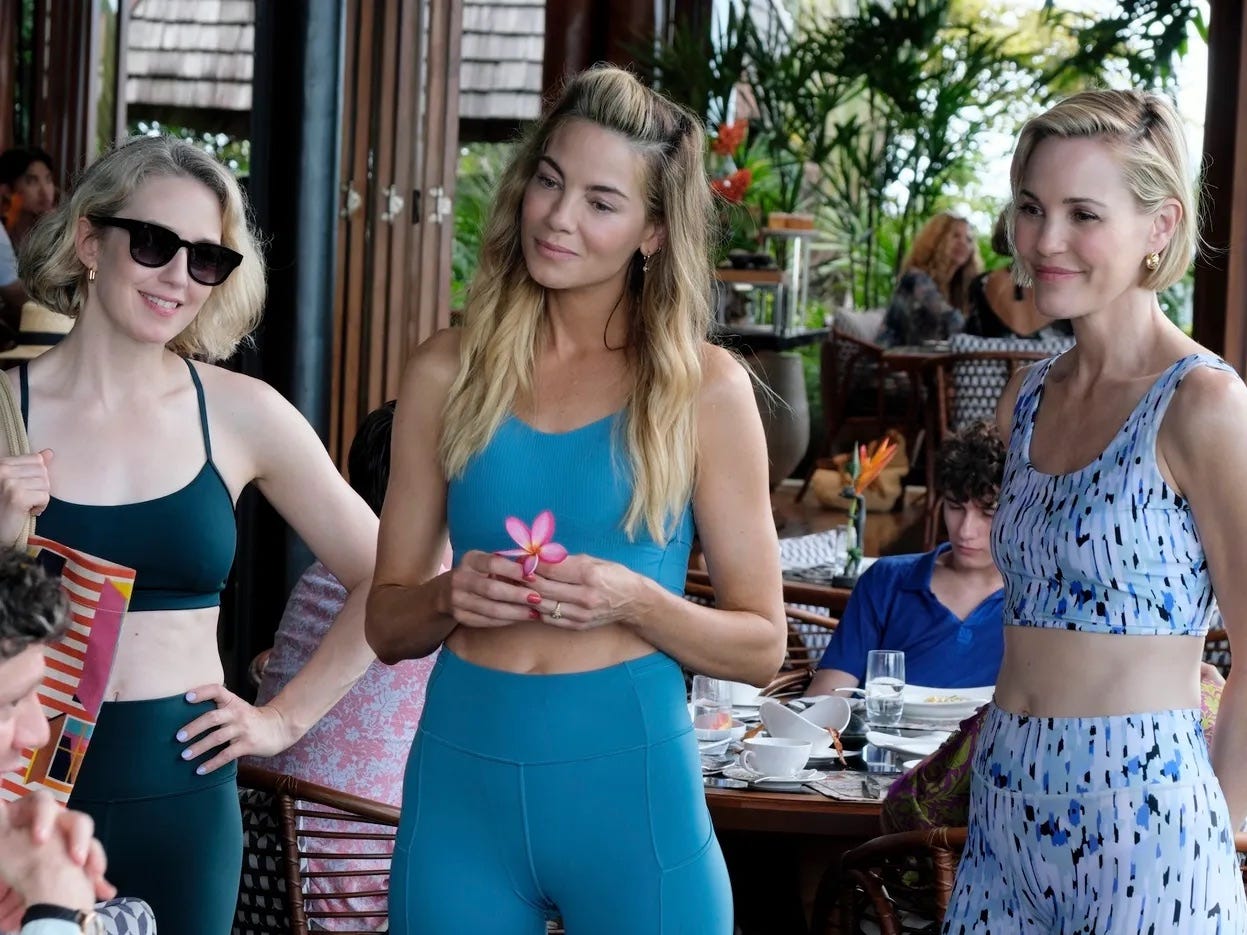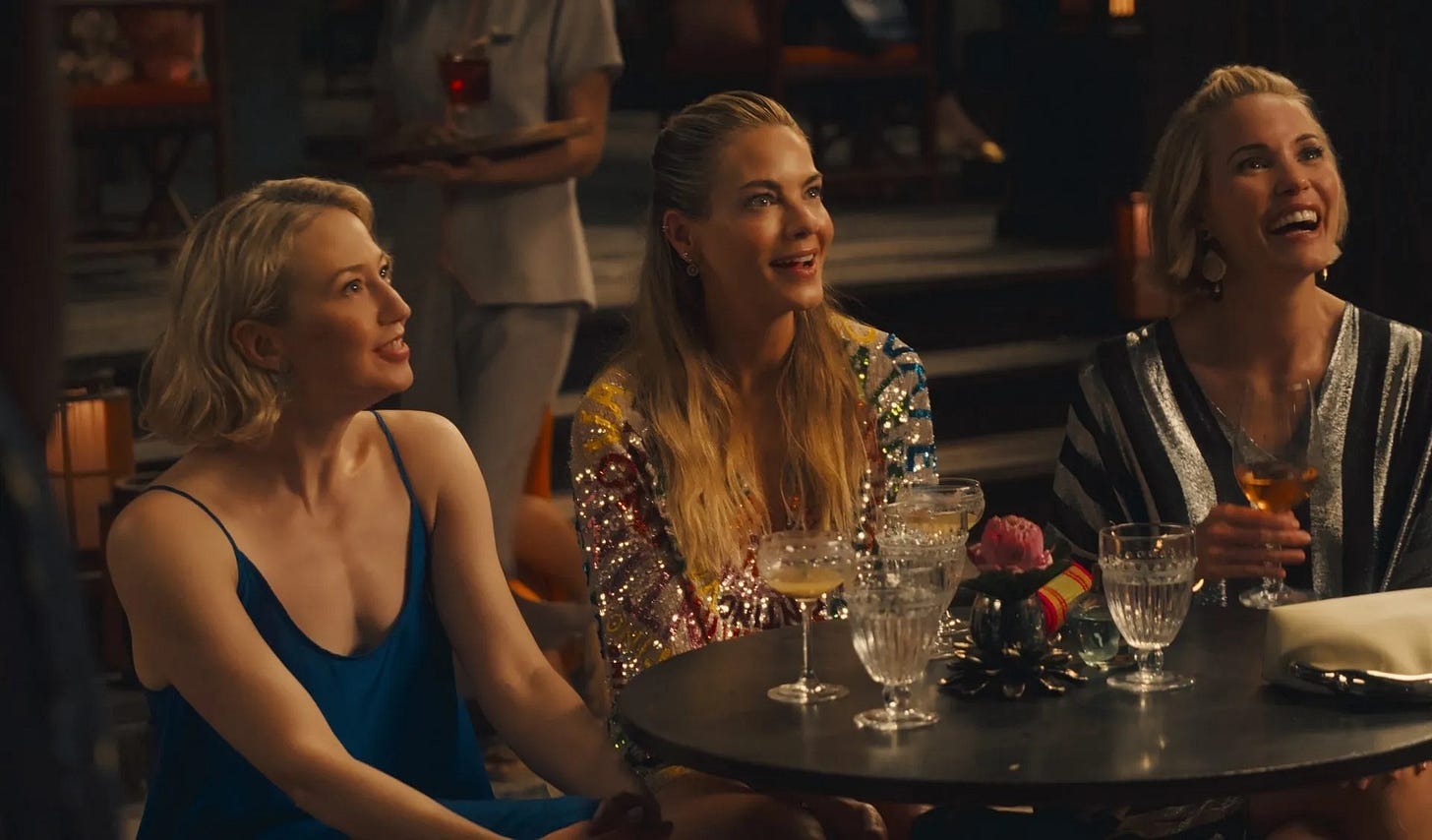Like everyone else, we were obsessed with this season of The White Lotus. And while the finale had the classic chaos the show’s become known for (RIP Chelsea, Rick, and the Ratliff's bank account)…for us, the “who died?” question wasn’t what enraptured us.
It was the three women.
Laurie, Jaclyn, and Kate–three longtime friends living it up on a lavish, chaotic Thai vacation–gave us something way more haunting than any hotel murder: a decades-deep friendship filled with love, resentment, envy, regret, and… baggage. It was the kind of dynamic that made us laugh and cringe at the same time because it felt so honest about the female experience.
Uncomfortably honest.
The fabric of friendship between these women was layered. And complicated. A patchwork of shared history, old wounds, unspoken judgments, and a sense of loyalty that’s stronger than all of it. It was hard to untangle. And as a viewer, it left us internally debating - should she pull THAT thread? Or is it best to leave it be?
After a season of side-eyes and those long, awkward silences at breakfast, we got Laurie’s monologue in the final episode, and it was a beautiful release of pent-up tension. When Laurie finally lets it out, we realize this isn’t just a drama about rich people being miserable in paradise, and *maybe* these aren’t women whose friendships are too f*cked up to last. Her final release brought a full-circle revelation about the occasionally toxic, sometimes healing, often complex friendships that carry us through life.
Even if they seem to be hanging on by a thread.
“We started this life together. I mean, we’re going through it apart, but we’re still together… even when we’re just sitting around the pool talking about whatever inane shit, it still feels very fucking deep.”
Why are we so drawn to these women? What do they reveal about the messy reality of long-term female friendships?
Who Are These Ladies Really?
Laurie was the button-pusher. She’s blunt, reactive, and emotionally raw with low glam and high grudge.
Then there was Jaclyn, the semi-famous actress and newlywed who married a much younger man. She’s an instigator of drama, but adept at delicately dodging responsibility for almost all of it.
And finally there’s Kate, the peacemaker. She plays therapist to both sides, always smoothing things over, always saying the right thing at the right time…but never saying what she really thinks.
Their friendship carries years of baggage, but it’s light on honesty. These are women who are stuck in their roles. Laurie is always frustrated, Jaclyn is always pretending not to notice, and Kate is always cleaning up after them.
There’s something very familiar about this, about the experience of acting out the same roles with our own friends that we’ve known since before our brains were fully formed. There’s something familiar about each of the toxic traits they possess, leaving us debating, “oh god, am I the Jaclyn? Or Laurie? Or Kate? What’s worse?” Each of the women held up a mirror to some of our own avoidant, people-pleasing, or griping tendencies in a way that’s uncomfortable to recognize - they served as a brilliantly real case study on group dynamics (especially groups of 3.)
All in all, we learned a lot from these women. Here are some of our takeaways:
1. Some Friendships Expire (And That’s Not a Failure)
We’re taught to believe that long-term friendships are always a virtue. And yeah, sometimes they are. But other times, they’re just a habit. This season shows what happens when a friendship is more about time served than a true bond.
For most of the season, we, as the viewers, are wondering what Laurie and Jaclyn even have in common - they didn’t appear to even really like each other, but had enough shared stories to refer back to to make dinners less awkward. Laurie resents Jaclyn for floating above conflict, and Jaclyn seems annoyed that Laurie carries the weight of her choices so visibly on her shoulders.
This is what happens when we cling to a friendship for the origin story instead of its current reality. We’re allowed to outgrow each other. We’re also allowed to admit that maybe the only thing keeping a friendship alive is a shared past, not a shared present.
2. The Myth of the Forever Friend
Laurie, Jaclyn, and Kate are stuck in a loop–same dance, different day. Laurie snaps, Jaclyn vanishes behind a confused smile, and Kate steps in to wave the white flag. Lather, rinse, repeat.
But what the group really needs is permission (from themselves and each other) to evolve. What worked in high school or college is clearly not working now. They might be the same age, but they’re all in different life stages with different emotional needs.
As women, we celebrate female friendship as this sacred, unbreakable thing. In theory, this is beautiful, but it’s dangerous when it means staying stuck in unhealthy dynamics just because we feel guilty about breaking something off.
Good friendships change. Healthy ones adapt. And sometimes, that means having the hard conversations or taking that awkward space apart and letting go of the roles you’ve outgrown.
3. No One Wants to Be the “Difficult” Friend
Throughout the season, Laurie got labeled as the dramatic or disgruntled one, but here’s the thing: she was pretty much the only one telling the truth, even though it didn’t contribute to the Thailand dreamscape they wanted to slip into.
We’re so quick to call women “difficult” when they express anger or frustration, but sometimes the difficult one is just the person who won’t pretend everything is fine. Laurie wants honesty. She wants accountability. She wants someone to say, "That hurt my feelings, too."
Instead, she gets Kate trying to mediate and Jaclyn changing the subject, so she feels stifled and unable to get validation about what she’s experiencing.
Composure is an important skill to master, but real friendship is not expecting each other to have it together 100% of the time. Forming close bonds requires lowering the pristine facade in order to connect on a soul level. Pretense is exhausting. And isolating. Eventually, it makes you feel like maybe the only way to be heard is to blow things up.
4. The Chill Girl Is (Sometimes) a Red Flag
Jaclyn is the poster girl for the “I don’t do drama” friend. But sometimes, that actually translates to “I don’t take responsibility for how I affect other people.”
She keeps it light. She says things like "let's just have fun" and "I don't want to get into that right now." Let’s be honest, it’s a little “pick me”... Jaclyn’s M.O. is, “I’m just not like other girls - I’m breezy.”
But she also disengages whenever emotions get too real, and then acts surprised when people (Laurie) explode. But disengagement is its own form of manipulation. It's the passive version of control. And it’s a way to avoid being accountable for your behavior, instead, making other people feel frazzled and guilty for having, I don’t know, feelings.
5. Keeping the Peace Can Mean Dodging the Truth
All season long, Kate seemed like the stable one–the neutral party, and maybe the bridge connecting Jaclyn and Laurie. But if you look closer, she’s not actually solving anything–she’s just delaying the inevitable.
Her soothing voice and calm presence cover up the fact that she never actually takes a stand. She doesn’t tell Laurie she has a point. She doesn’t tell Jaclyn to cut the passive-aggressive BS, either.
It’s easy to fall into the peacemaker role–especially for women, because we’re often taught to prioritize harmony over honesty. But real friendship requires more than being a human Pura and wafting fake peace into a room. It requires saying what you feel, even when it might make things uncomfortable.
So, What Do We Do With This?
This girl-gang trio wasn’t just good TV, they were a mirror. For anyone who’s ever stayed in a friendship that didn’t feel good anymore. For anyone who’s ever tried to bring up a hard feeling and been met with silence or spin or a "let’s just not ruin the vibe."
These characters show us what not to do. But they also offer a blueprint for what we could do differently. Be honest, even if it changes things. Let your friendships evolve. Let yourself evolve. And stop trying to be the version of yourself that made sense ten years ago just because that’s the one your friends recognize.
Should these women still be friends? Did Laurie’s monologue at the end serve as one last attempt to make things go back to how they were before? Or was it a final attempt at honesty, leading to a breakthrough, leading to a new chapter of more honest friendship?
Friendships are relationships. They deserve care, effort, communication, and sometimes even a little confrontation. Especially the long-term ones. Because if we want to keep them, we have to let them change.
Even if that means one day, someone finally says, "Actually, I don’t want to go on this group trip anymore."
…unless it’s to the Four Seasons in Koh Samui, because we’re forever down for our own White Lotus vacay (minus the body count).







"But disengagement is its own form of manipulation. It's the passive version of control. And it’s a way to avoid being accountable for your behavior, instead, making other people feel frazzled and guilty for having, I don’t know, feelings." Best take away (and there are a lot to take away!). In a similar vein I've had to learn how my people-pleasing was actually a form of manipulation (I could only be okay if everyone else was okay and appeased.) and it was a powerful realization. Looots of therapy and coaching later I'm much more likely to let people have their stuff (including..EMOTIONS lol) and I'm okay no matter what. It's liberating. Great stuff xo
This is the best piece of content (video, podcast, written) that I've consumed on the Girls Trip. Great job!
One thing that I thought after Laurie gave her beautiful monologue was that she would probably get on the plane, or get home, and realize she could not expect anything from Jaclyn or Kate, and they'd get an unannounced intimacy downgrade. She'd remove any true intimacy from her interactions with them, and, instead, would wade on over to their shallow end, and interact with them in a way they could handle.
To me, that is how you keep these kinds of friendships going. If you choose to stay in the relationship, you place time knowing each other on hallowed ground, and with that understanding, you meet the person (people) where they're at, and seek deeper connection elsewhere.
For some, the comfort gained from having someone "who knew (and abused) you then" is enough. And, I think there is true power and peace in recognizing exactly what you're dealing with, and making a sound decision based on that. In this trip, I feel (or maybe hope) that Laurie saw the limitations in both Jaclyn and Kate and, with heart, and eyes, wide open, accepted them.